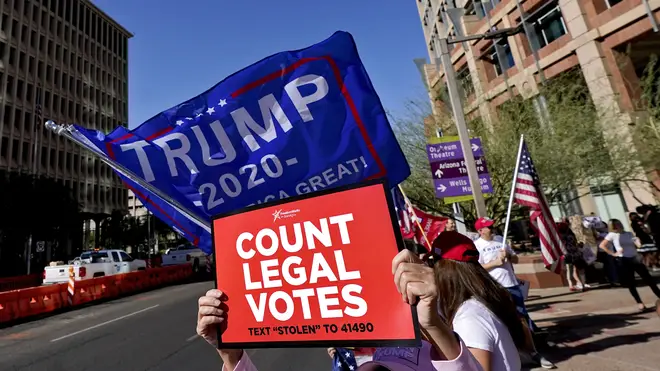
Richard Spurr 1am - 4am
6 November 2020, 18:34

The incumbent president has questioned the counts in key states as his opponent Joe Biden closes in on victory.
A key Republican senator said he saw no evidence to support President Donald Trump’s baseless claim that Democrats are trying to “steal” the election and called the president’s words “very disturbing”.
Senator Pat Toomey of Pennsylvania, whose state is a key battleground in the presidential election, said “there’s simply no evidence anyone has shown me of any widespread corruption or fraud” to supported Mr Trump’s claim Thursday of fraud in balloting.
“The president’s speech last night was very disturbing to me because he made very, very serious allegations without any evidence to support it,” Mr Toomey told CBS This Morning.
He added: “I voted for President Trump. I endorsed President Trump.
“I want the next president to be the person who legitimately wins the Electoral College and I will accept whoever that is.”
Here’s how this must work in our great country: Every legal vote should be counted. Any illegally-submitted ballots must not. All sides must get to observe the process. And the courts are here to apply the laws & resolve disputes.
That's how Americans' votes decide the result.
— Leader McConnell (@senatemajldr) November 6, 2020
Senator Mitt Romney, of Utah, said Mr Trump is within his rights to request recounts and call for investigations where evidence of irregularities exists.
But Mr Trump “is wrong to say the election was rigged, corrupt and stolen″, Mr Romney said on Twitter.
Mr Trump’s claim “damages the cause of freedom here and around the world… and recklessly inflames destructive and dangerous passions,″ Mr Romney said.
https://twitter.com/MittRomney/status/1324763757105602561/photo/1
Mr Trump, who has complained for weeks about mail-in ballots, escalated his allegations late on Thursday, saying at the White House that the ballot-counting process is unfair and corrupt.
Mr Trump did not back up his claims with any details or evidence, and state and federal officials have not reported any instances of widespread voter fraud.
Senate Majority Leader Mitch McConnell struck a neutral tone: “Every legal vote should be counted,” he tweeted.
“All sides must get to observe the process.”
Other Republican senators, governors and other elected officials swiftly pushed back against Mr Trump, a rare break with the president who keeps a firm grip on his party.

Representative Adam Kinzinger, a Republican from Illinois, tweeted that the president’s claims of fraud are “getting insane”.
If Mr Trump has “legit” concerns about fraud, they need to be based on evidence and taken to court, Mr Kinzinger said, adding: “Stop spreading debunked misinformation.”
Maryland’s Republican governor Larry Hogan, a potential 2024 presidential hopeful who has often criticised Mr Trump, said unequivocally: “There is no defence for the President’s comments tonight undermining our Democratic process.
“America is counting the votes, and we must respect the results as we always have before.”
“No election or person is more important than our Democracy,” Mr Hogan said on Twitter.
Other criticism, though less direct, came from members of Congress.
Faith in our election is as important as the outcome
Preserving it requires not allowing the outcome to be decided by either the media or a candidate
Transparently count every legally cast vote & allow courts to decide claims of irregularities or fraud on the basis of evidence
— Marco Rubio (@marcorubio) November 6, 2020
Senator Marco Rubio, a Florida Republican who spoke at a recent Trump campaign rally, said in a tweet that if any candidate believes “a state is violating election laws they have a right to challenge it in court & produce evidence in support of their claims”.
Mr Rubio said earlier: “Taking days to count legally cast votes is not fraud. And court challenges to votes cast after the legal voting deadline is not suppression.”
Senator Mitt Romney, the party’s presidential nominee in 2012, sought to provide a reassuring note.
Counting votes is often “long” and “frustrating,” Mr Romney said.
If any irregularities are alleged, “they will be investigated and ultimately resolved in the courts″, Mr Romney tweeted.
“Have faith in democracy, our Constitution and the American people.”
Mr Trump’s tweets earlier Thursday declaring victory and calling for officials to “Stop the count” were a test of how strongly he can keep Republicans in line as he tries to challenge the voting process in court.
Before Mr Trump’s speech in the White House briefing room, several Republicans challenged his attempts to halt vote-counting in Pennsylvania and other battleground states.